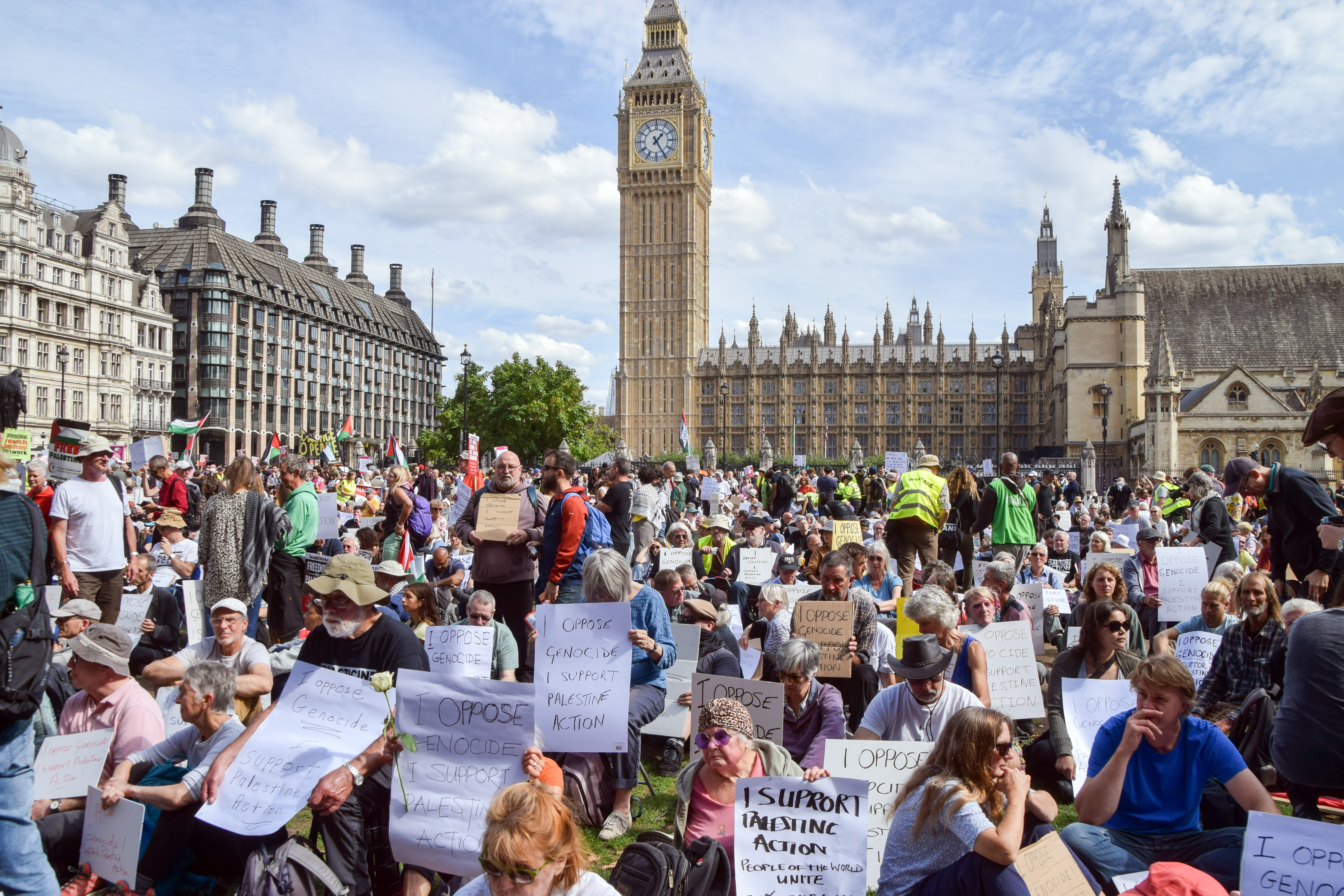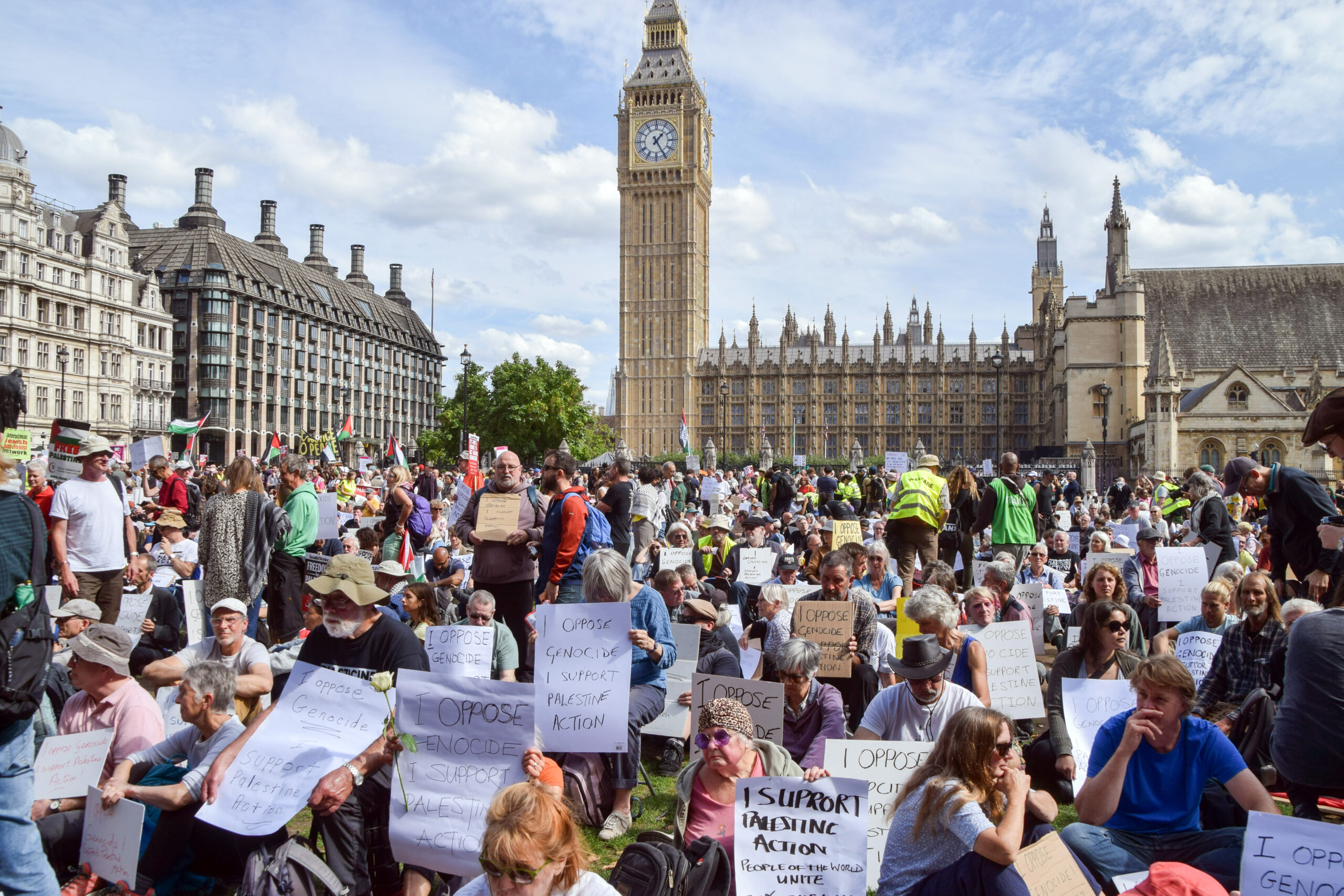On September 8, at least 800 peaceful protesters holding signs that read “I oppose genocide/I support Palestine Action,” were arrested in London’s Parliament Square, some on grounds of supporting an illegal organization under the United Kingdom’s Terrorism Act. The Labour Party administration of Prime Minister Keir Starmer had banned Palestine Action (PA), a group that engages in property destruction as part of its campaign against the “Israeli apartheid regime,” after it repeatedly sabotaged the factories of arms contractor Elbit Systems. A key supplier to the Israel Defense Forces, Elbit produces state-of-the-art rockets and bombs, attack drones, and guidance systems the companies says are battle-tested on the proving grounds of Gaza and elsewhere.
The PA actionists hadn’t harmed any living beings, but since the group’s founding in 2020, they have cost Elbit hundreds of thousands of dollars in damage. In 2022, Elbit lost out on a series of defense contracts with the UK government worth some $340 million, a loss which PA claimed was because their disruptions had become so widespread that Elbit was now an “unreliable supplier.”
In September, Elbit suddenly shut down a facility that the group had targeted dozens of times. Members of PA charged with criminal damage to an Elbit subsidiary were acquitted in December by a jury sympathetic to their argument that they were impeding civilian deaths in an ongoing genocide. “It was about valuing the lives of Palestinians more than the property and tools used to massacre them,” Palestine Action co-founder Huda Ammori told me.
Then came the declaration in July that Palestine Action was to be considered on the same footing as Al Qaeda, Hezbollah, and ISIS, along with other groups banned in the UK under the Terrorism Act, like Boko Haram, the Irish Republican Army, and the neo-Nazi Maniac Murder Cult. The decision roiled the Starmer administration. “It’s being widely condemned as a blatant misuse of anti-terror laws for political purposes to clamp down on protests which are affecting the profits of arms companies,” an anonymous source in the Home Office—roughly the UK’s Department of Homeland Security—told the Guardian.
The British public seems to agree, gathering by the thousands in cities across the country to signal their support for PA, or at least their condemnation of government overreach. Starmer hit back with the mass arrests of August and September, which set records for the largest number of protesters rounded up during a single demonstration in London. The circle of arrestees now widened to include those whose only apparent crime was that they supported the right to assemble and be heard. A lay minister named Martin Clay held a placard that said: “I don’t support Palestine Action but I support the right to support them.” He was arrested for expressing support for a terrorist organization.
In Glasgow, a 64-year-old man was arrested because he held a sign that said “Genocide in Palestine, time to take action.” His ostensible crime was that “Palestine” and “action” had been printed in larger font than the other words on his sign—here, in the nation that gave the world Magna Carta, habeas corpus, the modern parliamentary system, and the first bill of rights. “The mother of all democracies, people,” said a sign holder in Parliament Square as he was dragged to a paddy wagon.

The United States government doesn’t ban political organizations outright, but it does have a legal apparatus, put in place almost a quarter-century ago, for transmogrifying protesters into prosecutable terrorists. Following September 11, right-wing lawmakers saw an opportunity to broaden the definition of terrorists well beyond the likes of Al Qaeda members. A day after the attacks, Rep. Greg Walden (R-Ore.), took to the House floor to decry the Earth Liberation Front (ELF), which he said constituted a threat “no less heinous than what we saw occur yesterday here in Washington and in New York.” Starting in the mid-1990s, Earth Liberation Front cells across the United States had firebombed animal testing labs, ski resorts, and auto dealerships; released captive animals from industrial farms; and, central to Walden’s concerns, sabotaged logging and roading equipment. According to the FBI, the roughly 600 criminal acts attributed to the group between 1996 and 2002 resulted in more than $40 million in damages—but not a single injury or death.
Nonetheless, by 2005, ELF and associated saboteurs including the Animal Liberation Front (ALF) had been named by the FBI as “the No. 1 domestic terrorist threat.” The bureau’s Joint Terrorism Task Force issued a booklet regarding “terrorism imagery recognition” that depicted Osama Bin Laden, a Hamas suicide bomber, and a masked member of the ALF holding a primate. By 2012, Senator Rick Santorum (R-Pa.) inveighed against the “reign of environmental terror” by “radical environmental groups” that opposed his state’s fracking industry. Michael Loadenthal, a post-doctoral research fellow at the University of Cincinnati who studies the criminalization of dissent, posits that the figure of the “eco-terrorist” was a useful bogeyman for a government hell-bent on expanding its powers of surveillance and policing public protest.
“From the passage of the USA PATRIOT ACT, to the establishment of the federal DHS, increased electronic surveillance and the militarisation of domestic policing, the spectre of eco-terrorism has been touted at press conferences and in Congressional testimonies to shape budgets, craft policy and allow the State a freer hand in waging the ‘War on Terror,’” writes Loadenthal. At the same time, the eco-terrorist, by targeting industrial and commercial interests, was considered a genuine threat to the capitalist order.
The Animal Enterprise Terrorism Act, passed in 2006, marked the high point of the reactionary assault on environmental protest. Under AETA, crimes that had been prosecuted as misdemeanors punishable with fines or short stints in jail could be bumped up to felony “terrorism enhancements” that threatened punishments of decades in prison or even life sentences. Any person who engaged in any kind of disruption of a business that involved animals could be charged as a terrorist: throwing red paint on a meat processing plant; filming inside a slaughterhouse; picketing in front of the house of a researcher involved in animal testing—all prosecutable as acts of terror.
AETA only added to an already formidable arsenal for prosecuting terrorists, supplementing statutes passed by Congress in the 1990s that provided for increased prison sentences if any vaguely defined “material support” for terrorism could be proven. According to one recent study by a criminology student at the University of Alabama, the number of counts of material support in all terrorism cases post 9/11 increased by 3,130 percent.
Fast-forward to 2016, when resistance against the Dakota Access Pipeline involved thousands of people at the Standing Rock Sioux Reservation who came under attack by militarized police and private security units for blockading construction. Catholic Worker activists Jessica Reznicek and Ruby Montoya secretly sabotaged the pipeline for more than a year before they went public with their crimes. In October of 2016, five members of Climate Direct Action simultaneously turned emergency shut-off valves in four American states and then awaited arrest. State governments rushed to expand the criminal penalties for those who protested or sabotaged oil and gas facilities.
In Florida, trespassing on property that houses pipelines became punishable by up to five years in prison, as opposed to 60 days if convicted of trespassing on any other property type. Ohio lawmakers mandated up to six years in prison for those brazen enough to graffiti a pipeline, and up to ten years for entering a pipeline facility with the mere intention of tampering with it. In Arkansas and Alabama, citizens who trespass in any area that contains “critical infrastructure” risk between one and six years in prison and up to a $10,000 fine. Louisiana prosecutors can now file RICO charges, which carry a possible 50-year sentence, against protesters who “damage” fossil fuel infrastructure. In Mississippi, a conviction for impeding access to a pipeline or a pipeline construction site carries a sentence of up to seven years. If you protest a pipeline in North Carolina and “impede or impair” its construction, you could face more than 15 years in prison and a mandatory $250,000 fine.

The new pipeline trespass laws constituted the first wave of repressive legislation that targeted dissent in the era of Trumpian authoritarianism. The second wave arrived shortly after the George Floyd rebellion of 2020-21, when lawmakers introduced more than a hundred bills to restrict protests and ratchet up potential prison time. Thirty-five of those bills passed in 19 states, effectively criminalizing groups that protest in concert; at least 20 other anti-protest laws came into effect between 2017 and 2020.
“Nearly half of all Americans now live in a state where it’s harder to protest than it was eight years ago,” said Elly Page, an attorney who runs the US Protest Law Tracker at the International Center for Not-for-Profit Law. Some of the bills mandated extreme punishments for those who slow-march in roadways and block motorists. If 25 or more people impede traffic in Florida, they can be charged with “rioting” and face 15 years. Tennessee mandates up to 12 years for people convicted of “knowingly” obstructing roadways. In Louisiana, if you help plan a protest that might impede traffic—even if the protest never comes to pass—you can be charged with conspiracy and get six months. In Iowa, a driver who rams into protesters is safe from prosecution if he can prove to authorities that “due care” was taken.
Congress followed suit with its introduction in June of the Safe and Open Streets Act, which would make it a federal crime, punishable by up to five years in prison, to “purposely obstruct, delay, or affect commerce…by blocking a public road or highway.”
Defenders of a protest encampment outside Atlanta, who organized to protect forest habitat that was to be paved over for the construction of a police training facility dubbed Cop City, have been charged as domestic terrorists. Proposed bills in New York, Arkansas, West Virginia, Virginia, North Carolina, Oregon, and Texas would make blockading of streets during protest assemblies an act of “domestic terrorism” or establish potential terrorism charges generally for non-violent protesters.
We are now in the midst of the third legislative wave, in which lawmakers have struck back at pro-Palestine encampments and rallies—though so far in the US there’s been little of the kind of sabotage that Palestine Action has mounted, and almost no property destruction beyond the occasional graffiti. Arizona and Texas this year enacted blanket bans on all protest encampments on the campuses of state universities and colleges, while New York has proposed mandatory sanctions for campus protesters. Republicans in Congress have introduced four new bills that would block financial aid to students who commit an ill-defined “riot” offense, bar many student protesters from federal loans and loan forgiveness, and provide for visa revocation and deportation of noncitizens involved in a protest “riot.”
Naturally, the old bogeyman of the protester-as-terrorist has returned to center stage. “Many of our ‘elite’ academic institutions have become hotbeds for…pro-terror ideologies,” said Sen. Jim Banks (R-Ind.), sponsor of a bill that would make federal funds in colleges and universities contingent on tamping down on campus protest.
Trump’s attack on foreign students involved in pro-Palestine dissent on college campuses is tinged with the same protester-as-terrorist rhetoric. He declared Columbia University student Mahmoud Khalil, arrested in March and held without charge for three months, a “terrorist sympathizer.”
“This is the first arrest of many to come,” Trump wrote on social media. “We know there are more students at Columbia and other Universities across the Country who have engaged in pro-terrorist, anti-Semitic, anti-American activity.”
More arrests did come—not just of students, nor even domestic protesters. In July, an Ohio children’s hospital chaplain named Ayman Soliman was stripped of asylum and incarcerated based on his affiliation, well over a decade ago, with an Islamic charity once linked with the Muslim Brotherhood; Soliman now faces deportation to Egypt, a US ally that repeatedly tortured him as a dissident journalist.
The question now is whether the Trump administration will continue to expand the use of terrorism material support statutes to go after protest of all kinds—whether for Palestine, for racial justice, or for climate and the environment.















